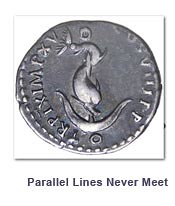
PREV ARTICLE
NEXT ARTICLE
FULL ISSUE
PREV FULL ISSUE
LECTURE: HISTORIANS AND NUMISMATISTS AND ROMAN COINSRegarding an upcoming lecture by Terry Belanger, Founder of Rare Book School, University of Virginia, George Kolbe writes: There is an expanded description of the lecture at: www.c1718cs.ucla.edu/calendar.htm . I thought Big E readers might like a reminder.
Below is the lecture description.
The full title is: Parallel Lines Never Meet:
Dolphins and Anchors and Aldus/Book Historians and Numismatists and Roman Coins .
-Editor
Erasmus tells us that Aldus derived the anchor-and-dolphin image from a first-century AD Roman silver coin, incorrectly attributing it to the reign of the Emperor Vespasian. In fact, the anchor-and-dolphin device was used only on silver denarii successively issued by Vespasian's two sons, the Emperors Titus (79 - 81) and Domitian (81 - 96). Following Erasmus, historians of the book have ever since consistently misattributed the anchor-and-dolphin denarius, which they tend to exalt as one of the most celebrated of all ancient coins, comparable in importance to the 30 pieces of silver and the widow's mite. Numismatists take a different view: the coin has never been of much interest to students of Imperial Roman coins, who almost never mention the Aldine connection. Terry Belanger's illustrated lecture, accompanied by a three-dimensional handout, is a case study in the way that different scholarly disciplines can sometimes fail to recognize the utility of evidence easily available from fields outside their own immediate areas of interest.

Wayne Homren, Editor The Numismatic Bibliomania Society is a non-profit organization promoting numismatic literature. See our web site at coinbooks.org. To submit items for publication in The E-Sylum, write to the Editor at this address: whomren@gmail.com To subscribe go to: https://my.binhost.com/lists/listinfo/esylum All Rights Reserved. NBS Home Page Contact the NBS webmaster 
|
